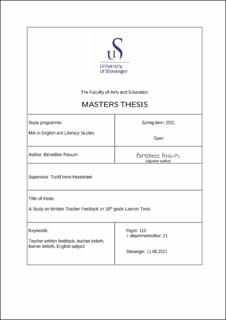| dc.description.abstract | The present thesis is a study about written teacher feedback on 10th grade learner texts in English. The study investigated teachers’ beliefs and practices related to feedback on learner texts in school as well as the learners’ beliefs about the feedback they receive from their teacher. In addition, the relationship between the teachers’ beliefs and practices and the learners’ beliefs and experiences on written feedback was discussed. A mixed methods approach was used to collect data, using semi-structured interviews, analysis of learner texts, and pupil questionnaires. The data was collected at two different lower secondary schools, where three teachers and 49 pupils participated.
The findings from the interviews were that the teachers share many of the same beliefs when it comes to providing feedback on written learner texts. They all believed that the feedback should not focus on every aspect of the learners’ writing that had improvement potential and all seemed to agree that the feedback should be individualized to each learner in order to improve the learners’ writing skills. What was evident from the interviews was the teachers’ wish for providing feedback on drafts in a process-oriented approach because of great improvements on the learner texts after working with drafts. Nevertheless, the lack of time made this way of providing feedback difficult, which often resulted in providing more feedback on written products. All teachers provided comments directly into the learner texts, as well as an end note with longer and more general comments on what the learners should focus on for future writing. It appeared to be important for the teachers to balance praise, criticism and suggestions in the feedback comments, and maybe even more crucial to always provide a positive comment since their beliefs were related to the pupils’ motivation and making them believe in their own writing abilities.
The questionnaire revealed the beliefs and experiences the pupils have about the feedback they receive, and it seemed as the pupils share many of the teachers’ beliefs on feedback. The majority of the pupils could see the importance of receiving feedback on their writing, in addition to believing the feedback is beneficial for their writing skills. Moreover, the majority of the pupils in each class, as well as across the three classes, appeared to agree on many of the same statements. Suggestions in the feedback comments were most preferable from the majority, but several did also agree on preferring praise in the comments from their teachers.
This research project has contributed to already existing research on feedback, both in relation to beliefs and practices. The strength of this study is that the data was collected in three ways, namely through interviews, analysis of learner texts and questionnaires. These methods
allowed the researcher to explore both teacher and learner perspectives on feedback, which suggested that the teachers and the majority of pupils believed that the feedback is important for the pupils’ writing development, as well as seeing improvements in the learner texts. In addition, both teachers and pupils believed that there should be a balance between the elements in a feedback comment and that especially suggestions and praise should be included. Furthermore, through the analysis, it was possible to see the actual teacher feedback in practice. The present study could contribute with information on why teachers respond to learner texts in the way they do and what beliefs the learners have about the feedback they receive. | |
